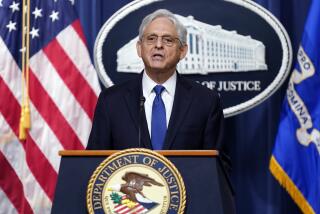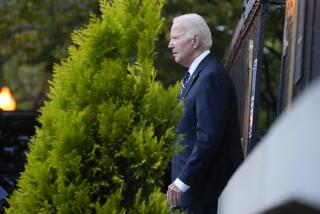Possible Subpoenaing of Clinton Cited
- Share via
WASHINGTON — President Clinton can probably be compelled to testify if Whitewater independent counsel Kenneth W. Starr decides to bring criminal charges against former White House intern Monica S. Lewinsky, a scenario that could raise thorny constitutional issues, Starr’s official spokesman said Sunday.
“I think most legal thinking on this that we’ve seen says that you can subpoena a sitting president,” Charles Bakaly said on the CNN program “Late Edition.”
“Now, whether that would happen or not, I can’t say, and there’s no decision,” he added.
Nevertheless, it was the first time that Starr’s office had publicly raised the prospect of subpoenaing Clinton to testify in a criminal proceeding, and it will probably increase the pressure on Clinton as Starr moves into the final stages of the Lewinsky investigation.
The comments also take on added significance in the context of a Washington Post report Sunday that the White House has decided that Clinton will refuse to fully explain his relationship with Lewinsky, despite his earlier promise to be forthcoming about what transpired between them.
Bakaly acknowledged that any effort to force testimony from a president could raise difficult constitutional and public policy issues, including whether a federal judge could hold a president in contempt for refusing to honor a subpoena.
“I think it’s troubling in the respect of a stated position not to testify or provide the information to the grand jury,” Bakaly said.
“There are very difficult constitutional issues here, and how does a . . . judge hold the president in contempt?” he added. “The only way a president can be removed from office is through impeachment. So, there are very important, not only legal, but public policy issues that are around here. And also, you have Congress’ duties . . . under the Constitution, with regard to impeachment, and we have to be sensitive to those as well.”
In the Watergate scandal, President Nixon finally submitted to the special prosecutor’s subpoena for White House tapes, but his later refusal to respond to the House Judiciary Committee’s subpoenas became one of the articles of impeachment brought by the committee.
Thus far, as far as is publicly known, Starr has only requested Clinton’s testimony rather than seek to compel Clinton to answer questions about whether he tried to conceal a sexual relationship with Lewinsky during the since-dismissed sexual harassment suit filed by former Arkansas state employee Paula Corbin Jones.
Jones worked for the state in the 1980s when Clinton was governor.
Clinton has denied having a sexual relationship with Lewinsky or ever asking anyone to lie under oath.
Before the Lewinsky stories surfaced, prosecutors had already talked with Clinton and First Lady Hillary Rodham Clinton about various matters pertaining to the collapsed Whitewater investment deal.
*
The U.S. Circuit Court of Appeals has heard arguments over whether White House deputy counsel Bruce R. Lindsey and three Secret Service agents--whose testimony Starr has been seeking--should be forced to answer questions.
But the rulings are certain to be appealed to the Supreme Court, which is unlikely even to decide whether to hear them before its 1998-99 term begins in October.
Bakaly also said Starr no longer plans to send the House an interim report on any offenses he believes could lead to impeachment.
“I think that that’s not the view now,” Bakaly said. “When it changed, I couldn’t say.”
*
Times staff writer Ronald J. Ostrow contributed to this report.
More to Read
Sign up for Essential California
The most important California stories and recommendations in your inbox every morning.
You may occasionally receive promotional content from the Los Angeles Times.













